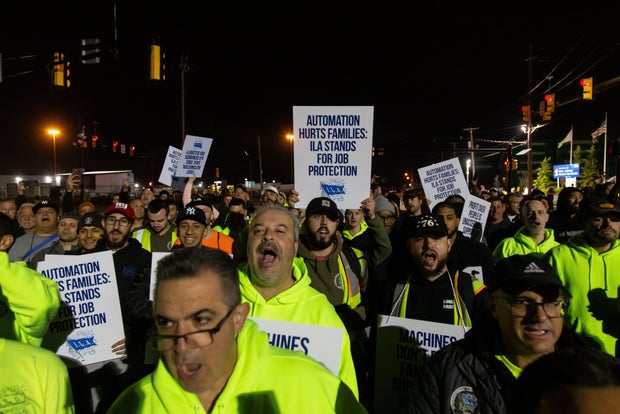Thousands of dock workers at ports from New England to Texas went on strike after midnight Tuesday.
A strike, first Eastern and Gulf Coast ports since 1977It follows a long impasse in labor negotiations between the International Longshoremen’s Association (ILA) and the United States Maritime Alliance (USMX).
According to USMX the strike was expected to involve 25,000 workers and close 14 ports: Baltimore; Boston; Charleston, South Carolina; Jacksonville, Florida; Miami (USMX teams Port Everglades with Ford Lauderdale, Florida, Port of Miami); Houston; Mobile, Alabama; New Orleans; New York/New Jersey; Norfolk, Virginia; Philadelphia; Savannah, Georgia; Tampa, Florida; and Wilmington, Delaware.
“The USMX brought this strike when it decided to clamp down on foreign-owned ocean carriers that make billions of dollars in profits at US ports, but not compensate the American ILA longshore workers who do the labor that brings them their wealth,” ILA President Harold Daggett said. said in a statement Published On social media. “We are prepared to stay out of the strike and fight as long as necessary to get our ILA members the wages they deserve and the protection against automation.”
The ILA is demanding substantial wage hikes and a total ban on the use of automated cranes, gates and container moving trucks for loading or unloading goods. Members of the union earn a base salary of about $81,000 a year, but some can earn more than $200,000 annually with high amounts of overtime.
Michael Nagel/Bloomberg via Getty Images
The union said that after the last USMX concession, it “shut down all ports from Maine to Texas…as tens of thousands of ILA rank-and-file members began picketing waterfront facilities up and down the Atlantic and Gulf coasts.” “The ILA ranks far below what members are demanding on wages and protections against automation.”
Port of New York and New Jersey said quickly Several facilities remained closed on Tuesday due to the strike. Virginia Harbor He did the same.
Workers began picketing at the Port of Philadelphia just after midnight, walking in a circle at a railroad crossing outside the port, chanting “no jobs without a fair deal,” the Associated Press reported, with billboards on the ILA side. “Automation hurts families: ILA stands for job security,” says one truck.
President Joe Biden, a close ally of organized labor, has so far declined to directly intervene, citing the need to respect collective bargaining rights. But business groups are sure to raise calls for action if the strike drags on.
National Association of Manufacturers Mr. Biden continues to use his authority under national security laws to negotiate the return of workers to the ports.
“The president can use his authority to protect producers and consumers, and we believe he will act soon,” Jay Timmons, CEO of the trade association, said in a statement.
Biden and Vice President Kamala Harris are “monitoring potential supply chain impacts and evaluating ways to address potential impacts,” the White House said in a statement Tuesday. “The president and vice president were briefed on the agency’s estimates that impacts on consumers, including critical areas such as fuel, food and medicine, are expected to be minimal at this time.”
Teamsters Union was invited The Biden administration should stay out of the labor problem and workers should “withhold their labor for the wages and benefits they have earned.”
The strike follows walkouts by US automakers Boeingamong others.
Potential impact on consumers and the economy
The ports affected by the strike handle half of the country’s shipping cargo. The economic impact of a prolonged strike could be steep, experts say, pushing up the prices of consumer goods and creating shortages ahead of the holidays.
A week of strike costs The US economy is nearly $3.8 billion And increase the cost of consumer goods, according to the Conference Board.
“Shipments diverted to the West Coast and then eastbound on freight networks could add at least a week of transit time and additional costs,” Wedbush Securities analysts said in a note to investors. “Because West Coast ports may not be able to fully absorb the level of disruption, we see the potential for ripple effects even for those with less exposure to shipments originally destined for the East Coast and Gulf Coast.”
For consumers and businesses, the prolonged strike will disrupt exports of bananas, manufacturing components, plywood and raw materials such as cotton and copper. Fresh meat and other refrigerated foods can also spoil, resulting in shortages and higher prices.
However, many retailers and other businesses have been preparing for months, stockpiling products that could be affected by port closures.
“Items for the holiday season usually ship between August and October,” Wedbush said. “That said, we believe most holiday-heavy retailers adjusted their schedules in anticipation of labor disruptions — limiting some short-term risks in our view.”
Shortly after the walkout began, New York Governor Cathy Hochul released a statement saying, “Her administration is working around the clock to ensure our grocery stores and medical facilities have the essential supplies they need. This is critical to the USMX and ILA. A fair contract that respects workers and through our ports.” We will continue our efforts to ensure the flow of trade and, in the meantime, minimize disruption to New Yorkers.
Hochul said in a press conference New York on Monday No shortage expected Advised consumers against stockpiling essential items, and supplies at any time.
contributed to this report.

